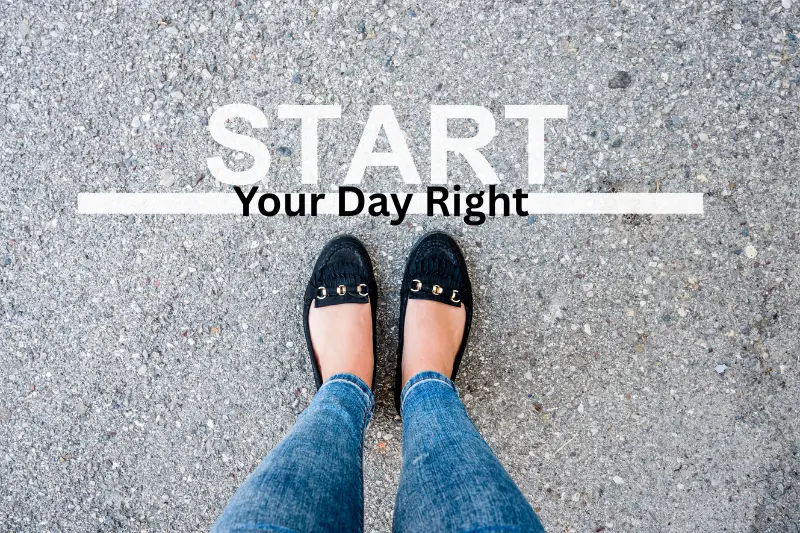Living a vibrant, energetic life isn’t about a complete overhaul of your routine. It’s about small, consistent actions that shape a strong foundation for your overall well-being. Whether you’re someone always on the move or someone trying to restart a healthier lifestyle, building daily habits that support a long, thriving life is entirely achievable. This article is your go-to guide on transforming your everyday lifestyle into a healthier one—step by step.
Daily Habits for Healthy Living may sound like a repetitive phrase thrown around in self-help circles, but there’s real science, psychology, and long-term success behind these habits. Let’s break them down into approachable, practical, and sustainable changes you can make—starting today.
Start Your Day Right

Hydrate Immediately After Waking Up
Water is life. After 6–8 hours of sleep, your body is dehydrated. Drinking a glass of water right after waking helps:
- Jumpstart your metabolism
- Flush out toxins
- Boost mental clarity
- Promote better digestion throughout the day
Additionally, starting your day with hydration helps reenergize the brain, lubricate joints, and balance the lymphatic system. Keeping a water bottle near your bed can remind you to make this habit automatic.
Practice Morning Movement
You don’t need a 60-minute gym session to be active. Just 10–15 minutes of morning movement, such as:
- Light stretching
- Yoga
- A brisk walk
- Bodyweight exercises
This signals your body to wake up, reduces stiffness, and enhances circulation. Morning movement increases dopamine and serotonin, improving your mood and preparing your mind for the day ahead.
Mindful Mornings Set the Tone
Add a few minutes of mindfulness each morning. Meditation, deep breathing, journaling, or even reading something uplifting can:
- Reduce stress levels
- Increase emotional resilience
- Improve focus and productivity
Setting intentions or repeating affirmations in the morning provides direction and clarity for your day. Mindful mornings encourage emotional regulation and strengthen your ability to stay calm during stress.
Eat for Energy and Vitality
Never Skip Breakfast
A balanced breakfast fuels your brain and body. Include a mix of:
- Protein (eggs, yogurt, nut butter)
- Healthy fats (avocado, nuts, seeds)
- Fiber (whole grains, fruits, veggies)
This combination keeps blood sugar stable and provides sustained energy. Skipping breakfast can lead to irritability, brain fog, and unhealthy cravings later in the day. Eating within 1–2 hours of waking also supports a healthy metabolism.
Eat Mindfully
Rather than rushing meals or eating in front of screens:
- Sit down to eat
- Chew slowly
- Appreciate flavors and textures
This improves digestion and helps you recognize when you’re full, preventing overeating. Mindful eating also helps you connect with your body’s hunger signals and enjoy meals more deeply.
Incorporate More Whole Foods
Minimize processed foods and aim to include:
- Fresh fruits and vegetables
- Lean proteins like fish, chicken, tofu, and legumes
- Whole grains such as brown rice, oats, and quinoa
Whole foods are rich in nutrients, fiber, and antioxidants that support long-term health. They help reduce inflammation, boost immunity, and regulate blood sugar. Preparing meals at home gives you better control over ingredients and portion sizes.
Ready to stop wondering and start knowing? Let’s dive in.
Unlock Wellness with Simple Healthy Lifestyle Changes
Ultimate Guide to Healthy Living for a Vibrant Life
Powerful Healthy Living Tips for a Better, Happier Life
Movement Throughout the Day

Avoid Long Periods of Sitting
Sitting for extended periods can increase the risk of chronic diseases. To counteract this:
- Take short walks every hour
- Use a standing desk if possible
- Stretch your body during breaks
Prolonged sitting slows circulation and can affect heart health. Moving every hour increases productivity and decreases back and neck pain. Try using reminders or apps that prompt you to stand or stretch.
Incorporate Functional Exercise
Functional exercises mimic real-life movements and help build overall strength. Aim for at least 30 minutes a day of:
- Squats and lunges
- Pushups and planks
- Resistance training
These exercises improve balance, mobility, and core strength. Incorporate cardio activities like brisk walking, cycling, or swimming for cardiovascular health. Exercise also boosts mental well-being by increasing endorphins and lowering stress.
Prioritize Mental Wellness
Daily Gratitude Practice
Gratitude boosts mood and reduces stress. Try:
- Writing down 3 things you’re grateful for daily
- Expressing appreciation to someone
- Reflecting on positive moments from your day
Gratitude shifts focus from what’s lacking to what’s present, enhancing life satisfaction. Keeping a gratitude journal can rewire your brain for optimism over time.
Limit Screen Time and Social Media
Too much screen time can lead to eye strain, sleep disturbances, and mental fatigue. Healthy screen habits include:
- Taking digital detoxes
- Turning off notifications
- Setting screen-free hours, especially before bed
Reducing screen time helps improve posture, encourages more face-to-face interactions, and can reduce anxiety or comparison triggered by social media.
Engage in Creative Activities
Creativity isn’t just for artists. Engaging in hobbies like painting, writing, music, or gardening can:
- Enhance mental clarity
- Reduce stress hormones
- Improve problem-solving skills
Creative activities activate the brain’s reward centers and can act as a therapeutic outlet. Scheduling time for hobbies adds joy and balance to your routine.
Sleep Hygiene: The Ultimate Reset
Create a Sleep-Inducing Environment
Your sleep environment matters more than you think. Ensure:
- A cool, dark, and quiet room
- Comfortable bedding and pillows
- No screens at least 1 hour before sleep
Use blackout curtains, white noise machines, or essential oils like lavender to enhance sleep quality. Your bedroom should be a sanctuary that supports rest.
Stick to a Consistent Sleep Schedule
Even on weekends, try to go to bed and wake up at the same time. This supports your body’s natural circadian rhythm and improves sleep quality.
A regular sleep-wake cycle improves energy levels, concentration, and immune response. Aim for 7–9 hours of quality sleep per night.
Wind Down Properly
Help your mind transition into rest by:
- Reading a physical book
- Taking a warm bath
- Doing gentle stretches or breathing exercises
Avoid caffeine, heavy meals, or intense exercise before bed. A calming bedtime routine signals your brain it’s time to rest and enhances sleep efficiency.
Hydration and Detox
Drink Ample Water
Most adults need at least 2–3 liters of water daily. Benefits of staying hydrated include:
- Increased energy
- Better skin health
- Improved digestion
- Natural detoxification
Water supports brain function, regulates body temperature, and aids nutrient absorption. Carrying a reusable bottle encourages consistent hydration.
Include Herbal Teas and Detox Drinks
Incorporate beverages like:
- Green tea
- Lemon water
- Ginger tea
These support metabolism, liver function, and immune health. Herbal teas also reduce inflammation and aid relaxation, making them ideal for evening routines.
Build Strong Relationships
Social Interaction Matters
Positive social connections boost happiness and longevity. Make time to:
- Call a friend or family member
- Engage in community activities
- Join interest-based groups
Strong social ties improve mental resilience and reduce feelings of loneliness. Engaging with others provides emotional support and a sense of belonging.
Practice Empathy and Active Listening
Healthy communication enhances relationship quality. Listen more, judge less, and express yourself openly.
Empathy strengthens trust and understanding, creating deeper bonds. Being present in conversations fosters emotional safety.
Set Boundaries When Needed
Saying no is a powerful self-care habit. Boundaries protect your time, energy, and mental peace.
Learning to assert your needs without guilt prevents burnout. Boundaries maintain mutual respect in relationships and improve life balance.
Stress Management That Works
Breathwork and Meditation
Even 5 minutes of conscious breathing can:
- Calm your nervous system
- Reduce anxiety
- Sharpen focus
Guided meditations or apps like Calm and Headspace make it easier. Consistent practice can reshape your response to stress and increase mental clarity.
Simplify Your To-Do List
Instead of overwhelming yourself, prioritize:
- 3–5 main tasks a day
- Time-blocking to stay organized
- Breaks between tasks to reset mentally
Keeping your list manageable reduces pressure and helps you feel more accomplished. Use tools like planners or apps to visually organize tasks.
Laugh Often
Laughter reduces cortisol, boosts immunity, and fosters social bonds. Watch a comedy show, spend time with funny people, or play with pets.
It also improves cardiovascular function and relieves physical tension. Making time for joy helps you cope better with life’s challenges.
Consistency and Reflection
Use a Habit Tracker
Tracking keeps you accountable. Whether it’s a physical journal or a digital app, noting your habits:
- Builds momentum
- Highlights progress
- Helps spot patterns
Habit trackers provide visual cues that encourage consistency. They also help identify which habits are most effective for your goals.
Reflect Weekly
Set aside time each week to:
- Review what worked
- Identify challenges
- Adjust your approach accordingly
Weekly reflection boosts self-awareness and prevents burnout. It’s a chance to celebrate progress and plan strategically.
Celebrate Small Wins
Acknowledging achievements—even tiny ones—boosts motivation and helps build positive reinforcement.
Small wins build confidence and keep you engaged. Recognizing progress enhances persistence and reinforces your healthy identity.
Final Thoughts
Adopting daily habits for healthy living doesn’t require perfection—it requires consistency. Start with a few small changes and build gradually. Over time, these daily choices stack up and become second nature, leading to a healthier, happier, and more balanced life. Make your well-being a priority, and your life will reward you in ways beyond physical health—emotionally, mentally, and spiritually as well.
FAQs
What are the most important habits for a healthy lifestyle?
Some of the most essential habits include staying hydrated, eating balanced meals, exercising regularly, getting enough sleep, and managing stress through mindfulness or relaxation techniques. These habits support both physical and mental health.
How can I stay consistent with healthy habits?
Start small and build gradually. Use habit trackers, set reminders, and celebrate small wins. Staying accountable and focusing on progress, not perfection, helps turn habits into part of your daily routine.
Can daily habits really improve mental health?
Yes, daily habits like gratitude journaling, limiting screen time, staying active, and engaging in hobbies can significantly improve mood, reduce anxiety, and increase overall emotional resilience.
What’s the best time to exercise for daily energy?
Morning workouts can boost energy and mood for the day ahead, but the best time is when you can stay consistent. Whether it’s morning, afternoon, or evening, regular movement is what matters most.
How much water should I drink each day?
Most adults should aim for 2–3 liters of water daily. However, your needs may vary depending on activity level, climate, and health conditions. Listening to your body’s thirst cues is also important.




